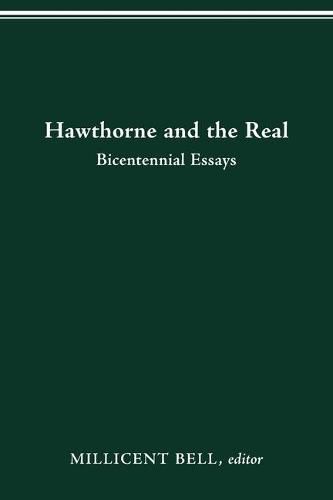Readings Newsletter
Become a Readings Member to make your shopping experience even easier.
Sign in or sign up for free!
You’re not far away from qualifying for FREE standard shipping within Australia
You’ve qualified for FREE standard shipping within Australia
The cart is loading…






This title is printed to order. This book may have been self-published. If so, we cannot guarantee the quality of the content. In the main most books will have gone through the editing process however some may not. We therefore suggest that you be aware of this before ordering this book. If in doubt check either the author or publisher’s details as we are unable to accept any returns unless they are faulty. Please contact us if you have any questions.
In this edited collection commemorating the bicentennial of Hawthorne’s birth in 1804, Millicent Bell gathers essays by distinguished scholars and critics that examine the ways in which Hawthorne related himself to the real in his own world and expressed that relation in his writing. Radically revising the older view that he was detached from conditions of actual life in 19th-century American society, the authors undertake to show how current social conditions, current events, and political movements taking place at a crucial point in American history were an evident part of Hawthorne’s consciousness. The essays situate his imaginative writings in a contemporary context of common experience and rediscover a Hawthorne alert to pressing problems of his day, especially slavery, feminism, and reform in general-the very issues that motivated his contemporaries on the eve of the Civil War. Hawthorne was, with his own complicity, long described as a writer of unreal romances (as he preferred to call his novels) or allegories of the heart as he termed some of his short stories. But the literary mode of his fiction has long needed to be redefined. The essays in this collection contribute to the turn in recent Hawthorne criticism which shows how deeply implicated in realism his writing was. This volume should long continue to provide new starting points for changing views of a great writer.
Contributors:
Millicent Bell Nina Baym Michael T. Gilmore Leland S. Person David Leverenz Larry J. Reynolds Lawrence Buell Rita K. Gollin John Carlos Row Brenda Wineapple
$9.00 standard shipping within Australia
FREE standard shipping within Australia for orders over $100.00
Express & International shipping calculated at checkout
This title is printed to order. This book may have been self-published. If so, we cannot guarantee the quality of the content. In the main most books will have gone through the editing process however some may not. We therefore suggest that you be aware of this before ordering this book. If in doubt check either the author or publisher’s details as we are unable to accept any returns unless they are faulty. Please contact us if you have any questions.
In this edited collection commemorating the bicentennial of Hawthorne’s birth in 1804, Millicent Bell gathers essays by distinguished scholars and critics that examine the ways in which Hawthorne related himself to the real in his own world and expressed that relation in his writing. Radically revising the older view that he was detached from conditions of actual life in 19th-century American society, the authors undertake to show how current social conditions, current events, and political movements taking place at a crucial point in American history were an evident part of Hawthorne’s consciousness. The essays situate his imaginative writings in a contemporary context of common experience and rediscover a Hawthorne alert to pressing problems of his day, especially slavery, feminism, and reform in general-the very issues that motivated his contemporaries on the eve of the Civil War. Hawthorne was, with his own complicity, long described as a writer of unreal romances (as he preferred to call his novels) or allegories of the heart as he termed some of his short stories. But the literary mode of his fiction has long needed to be redefined. The essays in this collection contribute to the turn in recent Hawthorne criticism which shows how deeply implicated in realism his writing was. This volume should long continue to provide new starting points for changing views of a great writer.
Contributors:
Millicent Bell Nina Baym Michael T. Gilmore Leland S. Person David Leverenz Larry J. Reynolds Lawrence Buell Rita K. Gollin John Carlos Row Brenda Wineapple